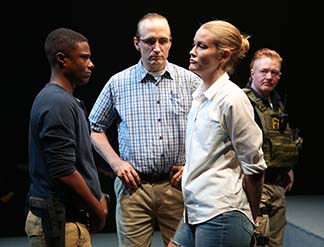By Lucy Komisar
I don‘t know what the title means. And I don‘t know what the play is supposed to mean. Other than that Reality Winner is a loser. And so is the “conceiver” and director Tina Satter, who decided that a Q&A with a couple of FBI agents was enough to be a play. About someone with security clearance who downloaded a classified report and sent it to some media. Without telling us what it was about. Or who she sent it to. Or why.

Well, Satter had the recorded FBI encounter, so why bother with the real story? What is the point of this play? To subtly promote another fake U.S. intelligence agency story about Russian election hacking, except it doesn’t even say that’s why Reality was arrested.
We learn from this staged transcript of her 2017 arrest that Reality, 25, was an Air Force veteran [in the military for six years] a translator who spoke Farsi, Dari, and Pashto and worked for the National Security Agency. If she joined the military before 19, she didn‘t get a post-high school education. It shows.
We do not learn that she was an intelligence specialist accused of leaking an NSA document that spun a long story about an unproved Russian attempt to hack American voting machines in 2016. Turns out the report claimed, with no evidence, that the villains (who obviously must be Russians, right?) attempted to hack a software supplier and sent phishing emails to officials.
We do not learn that two days after her arrest the website The Intercept published an article about a top-secret NSA document dated May 5, 2017 that described alleged Russian attempts to hack the U.S. voting system, including a cyberattack against an unnamed company that sells voter-registration-related software and phishing attempts against 122 local election officials. There was no evidence supplied, just colorful charts.
Yes, it was from Reality. The Intercept, by the way, is known as a sieve that doesn’t properly protect secret sources, a fact pointed out by journalists at the time of Reality‘s arrest.
According to The Hill which read the document more carefully: “The report does not claim that voting machines were hacked, a once-popular post-election theory from Democrats, nor does it state whether the information pertaining to the voting systems could be used to hack those systems.”
And federal officials told a Senate hearing just after The Intercept report in 2017 that there was no evidence state voting was hacked.

Reality was so naive or so dumb, she didn‘t realize she had a typical intelligence agency “the Russians did it” or in this case “wanted to do it” invented narrative with no evidence. Because that’s what intelligence analysts are paid for. Didn’t she know that if the spooks had real evidence they would leak it to their media acolytes?
For sending The Intercept the document, she was charged under the Espionage Act, accused of potentially causing “exceptionally grave damage” to national security by leaking a classified document that, the government claims, contains “national defense information.” Really? That the U.S. intelligence agencies make stuff up? And “espionage?”
The Espionage Act was passed in 1917 to suppress opposition to World War. It labels leakers as spies and makes fair trials impossible, as relevant evidence is classified and kept from the defense. Who was Reality spying for? The American public against the intelligence agencies? The Espionage Act casts a very wide net. Excluding people like former 4-star general CIA Director David Petraeus whose leaks to his girlfriend were brushed off. You don’t really believe the law applies to everyone, do you?
Media like the NYTimes would write in egregious fake news that Reality was “accused of sharing a classified report about Russian interference in the 2016 election with the news media.” What Russian interference? Never documented. And it would say the report “described hacks by a Russian intelligence service against local election officials and a company that sold software related to voter registration.” Except there was nothing in the report proving Russian intelligence interference and hacks. (See The Hill.)
Reality pleaded guilty in order to avoid a trial she could not afford and a defense made difficult by the government banning her lawyers, who were in different cities, from discussing the case other than in a secure room. She is serving 63 months in prison, the longest sentence ever given for releasing government information to the media. But you wouldn’t know any of this from the play.
Compare this disappointing script with the new film “Official Secrets,” the admittedly much more complex but riveting story of Katharine Gun, a British intelligence agency translator who leaked a memo detailing illegal U.S. spying on diplomats who would vote on a UN resolution on the invasion of Iraq. U.S. purpose: intelligence and possible blackmail. A film of substance. Her smart lawyers demanded documents for the defense, so the prosecution dropped the case!

But you don‘t learn anything in Satter’s play about the steamy report Reality sent The Intercept. Or even why she did it. Was she a Russophobe who wanted to persuade the public of the invented Russian interference in the 2016 election? Pretty ironic then if she was caught in the American surveillance net.
Instead we get a boring account of the initial encounter of Reality (an appropriately naive Emily Davis) with nice-guy FBI agents Garrick and Taylor (Pete Simpson and TL Thompson) who come to her home. Also about her dog and cat (a stuffed dog is dragged onstage), that she has a weapon stashed inside the house, that she translates Farsi and Pashto, and she was hoping to get a promotion. (Sending a classified document to reporters is the sure way to do that!) All utterly irrelevant to the case.
And, why for pity‘s sake, are her first words to the FBI not “I want a lawyer!” This dodo, who has been told (in a statement obviously required of FBI agents) that the conversation is voluntary, nonetheless admits all. Is she brain dead? Does she think that her government, including FBI agents, can do no wrong?
A flyer provided on exit says Reality Winner was sentenced “under the Espionage Act, for leaking a document that showed proof of Russian interference in the 2016 presidential election.” Even that is not true! There was no proof! Election officials of the alleged state targets denied it!
That one sentence is so wrong that maybe it‘s fortunate that Tina Satter did not attempt a play about the real Reality Winner story.
Is This A Room. Conceived and directed by Tina Satter. Vineyard Theater, 108 E 15th St, New York City. (212) 353-0303. Opened Oct 21, 2019; closes Nov 24, 2019. 70 min. 10/23/19. Also on NY Theatre Wire.
Post Script: A whistleblower is someone who reveals wrong-doing by a public or private person or agency. Someone like Julian Assange exposing U.S. war crimes. But see this Oct 22 Intercept article which falsely labels its source, Reality Winner, a whistleblower when she didn’t blow the whistle on any person or agency, she just leaked a confidential document she wanted made public. So call her a leaker. Except whistleblower is more glamorous and brave! The Intercept whistleblower story doesn’t mention the egregiously abused whistleblower Assange.


Good job, Lucy.
Pingback: How I got attacked by the Cancel Culture and am reviewing the press agent instead of the play : The Komisar Scoop
Pingback: “Russian Troll Farm” uses proven lies to promote Russophobic propaganda : The Komisar Scoop